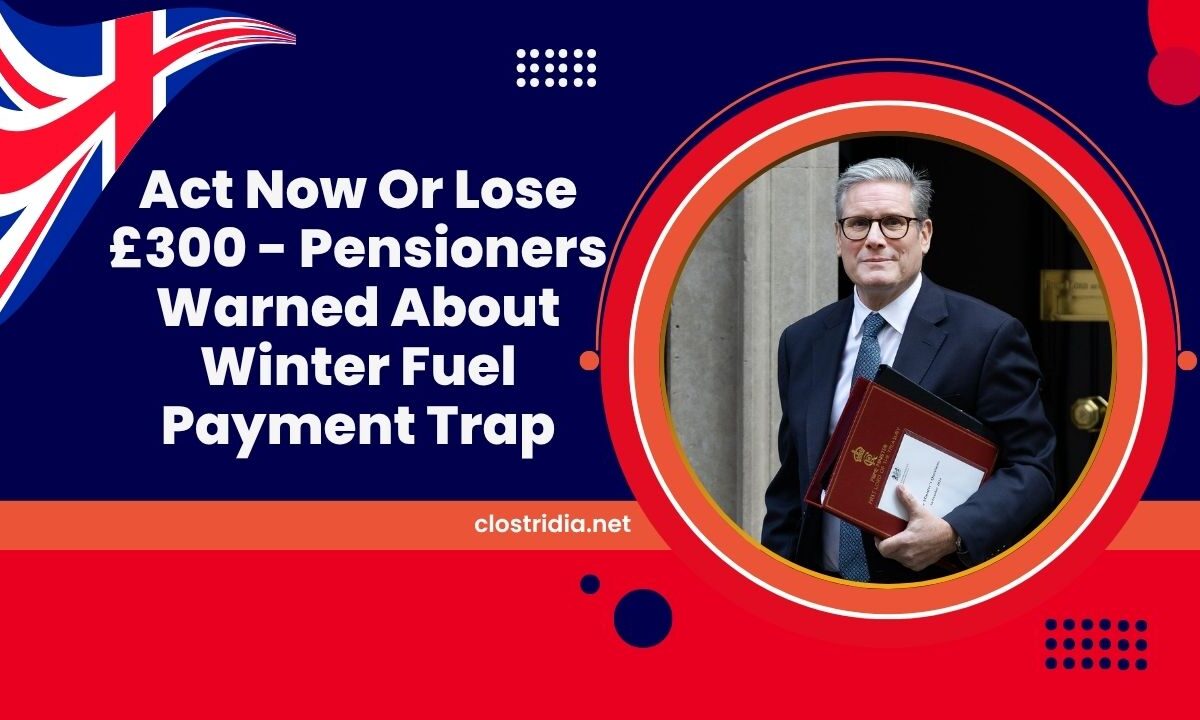Millions of pensioners across the UK are being warned: failing to plan now could cost you up to £300 in Winter Fuel Payment support. Due to newly introduced income limits, those with taxable income over £35,000 risk having to repay their Winter Fuel Payment.
With energy bills still high, this government U-turn offers expanded support—but only for those who qualify under the new criteria. Strategic action is now essential.
What Is the Winter Fuel Payment?
The Winter Fuel Payment is a government scheme aimed at helping older individuals manage rising energy costs during the colder months. For winter 2025:
- Pensioners will receive £200 per household.
- If someone in the household is aged 80 or over, the payment increases to £300.
- This year, nine million pensioners are expected to benefit.
However, unlike previous years, a strict £35,000 taxable income cap now determines eligibility.
Key Details at a Glance
| Criteria | Details |
|---|---|
| Payment Amount | £200 or £300 (if aged 80+) |
| Income Threshold | £35,000 taxable income |
| Who Qualifies | Pensioners with income below limit |
| Above Threshold? | Payment still given, but repaid |
| Payment Method | Direct to bank account |
| Recovery Method | HMRC via PAYE or Self-Assessment |
| Qualifying Week | 15–21 September 2025 |
| Payment Window | November to December 2025 |
Understanding the Income Rules
The £35,000 cap applies to taxable income only, not total income. This includes:
- State pension
- Private pension
- Salary
- Interest from savings (non-ISA)
Importantly, income from ISAs, Premium Bonds, and tax-free pension withdrawals do not count towards the cap.
Even pensioners with incomes slightly over £35,000 will be required to repay the full amount of the Winter Fuel Payment—either by a tax adjustment or via self-assessment returns.
Strategic Planning Can Help
Experts are advising pensioners to “plan smart” and look into ways to reduce taxable income in order to qualify for the payment and avoid unnecessary tax repayments.
1. Shift Savings to ISAs
If your savings are generating interest outside of an ISA, it could push you above the threshold. Moving money into an ISA makes the interest non-taxable, and therefore excluded from income calculations.
2. Use Premium Bonds
For those who’ve maxed out their ISA allowances, Premium Bonds are a great alternative. Any winnings are tax-free and don’t count toward taxable income.
3. Adjust Pension Withdrawals
If you’re drawing income from a private or workplace pension, consider taking a smaller taxable portion and supplementing it with tax-free cash (up to 25% of your pension pot) or ISA withdrawals.
4. Income Distribution Between Couples
If one partner in a couple earns more than £35,000 and the other does not, shifting income-generating assets (where legally permissible) can help both qualify.
5. Charitable Giving with Gift Aid
Donations made via Gift Aid allow you to deduct the donation plus 20% tax from your taxable income. This could make the difference in staying below the income cap.
Example Scenario
| Income Source | Before Planning | After Planning |
|---|---|---|
| State Pension | £10,000 | £10,000 |
| Pension Withdrawals | £30,000 | £25,000 |
| ISA Withdrawals (Non-Taxable) | £0 | £5,000 |
| Total Income | £40,000 | £40,000 |
| Taxable Income | £40,000 | £35,000 |
By switching £5,000 of pension income to an ISA withdrawal, the individual lowers taxable income while maintaining the same total income—qualifying for the Winter Fuel Payment.
Don’t Forget the Deadline
- The qualifying week for this year’s Winter Fuel Payment is 15–21 September 2025.
- Pensioners expecting to exceed the £35,000 threshold may consider opting out before that week to avoid repayment complications.
- Payments will begin from November 2025, landing directly into bank accounts.
The revised Winter Fuel Payment rules for 2025 mean that millions of pensioners must now review their income strategy to avoid losing out on up to £300 in vital energy support.
With smart planning—using ISAs, adjusting pension withdrawals, and strategic gifting—you can remain under the £35,000 taxable income threshold and keep your full Winter Fuel Payment.
Act now—before September’s deadline—to make sure you’re not caught in the trap.
FAQs
Will I automatically receive the payment if I qualify?
Yes, if you meet the criteria during the qualifying week and don’t opt out, the payment will be made automatically between November and December.
Do I need to repay the Winter Fuel Payment if I earn over £35,000?
Yes. If your taxable income exceeds £35,000, you’ll receive the payment initially but will be required to repay it through your tax return or PAYE system.
Is it worth deferring my State Pension to stay under the income cap?
Possibly. Deferring your pension increases future payouts and reduces taxable income temporarily, helping you qualify this year. But it depends on personal circumstances and should be evaluated carefully.


Too many ifs ands and buts with set of bankers. All they need is a microscopic gap to wriggle in to take your WFA off you. This is from one of the ten million pensioners they robbed last year. They should have been sanctioned for that. Banned from being a politician or civil,
servants